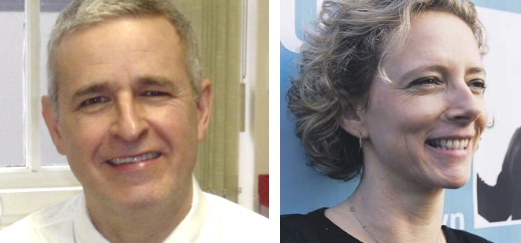Reclaiming Social Work (RSW) is a radical new system for delivering child and family social work in the UK. The system was first implemented in the London Borough of Hackney, and has since gained national recognition.
Social workers Steve Goodman and Isabelle Trowler are co-founders of the RSW model, and co-authors of the new book, Social Work Reclaimed: Innovative Frameworks for Child and Family Social Work Practice.
In this interview, Steve and Isabelle discuss the many benefits of their innovative social work model for social workers and for the families they support.
Can you tell us about the Reclaim Social Work (RSW) approach and how it differs from conventional models of child and family social work?
The model is a response to what social workers, families and young people up and down the country have been saying for years about their experience of statutory child and family social work services. In general traditional operational models and organisational cultures tend to strangle rather than encourage good social work practice. Of course there has always been excellent social work practice too, but it has often been in spite of the machinery developed to support practice, and rarely because of it! Social workers are often their own worst critic and have been loud and vocal about what the problems were, and also what was likely to fix it. We devised a model that addresses their concerns; our model actually owes much to the struggles faced by social workers in local authorities over the last 20 years.
Essentially, RSW frees up social workers to work alongside families to help them change, taking much of the bureaucracy away from social workers. It also acknowledges what a difficult job child and family social work is, particularly in local authority child protection contexts. The Social Work Unit, led by a Consultant Social Worker, brings together a small group of staff to work with families, bringing a range of perspectives and skills to bear on the complex work that needs to be done. It ensures faster work that is more reflective, evidence-based and expert, which achieves good outcomes for children.
We are so convinced at the efficacy of the model that we have set up our own social enterprise – Morning Lane Associates – whose aim is to promote good social work practice nationally and internationally.
Did you experience resistance when you first tried to implement the model and, if so, how did you overcome this?
To begin with we set out our ideas in a consultation paper that we presented to a series of staff conferences in Hackney. And no we didn’t get much resistance to the ideas because they spoke to the frustrations and aspirations of the staff. In fact, we were applauded! There were, and rightly so, lots of questions raised about the detail of how the model would work and we had to work alongside staff over many months thinking through the best way to do things. There was debate and difference of opinion, certainly, but actually this is in essence a key part of the model. Getting to the best conclusion through rigorous, intellectual debate is often the best way to decide how we should be working with families.
Obviously the change process itself is scary for staff involved in it. Cambridgeshire is just going through this process at the moment and the leadership there has been very focused on communicating with staff and supporting them through the process. Most social workers see the benefits of the model so want to get to the implementation stage as quickly as possible.
What, broadly, were the experiences of frontline social workers in Hackney working within the RSW framework? What results has it achieved? Were there any particularly surprising results which arose when you piloted the model?
Well, firstly, we never piloted the model, we just went to scale from the start. We were absolutely convinced by its potential effectiveness. We knew our responsibility was to implement it with determination. We would argue that the model will never be what fails; careful implementation, value-driven management and leadership behaviours are what makes the model fly – if these don’t exist, it will flounder. It did take us two years to fully implement it, and the experience of being part of that monumental change process will be different to those that arrive today. In those early months, social workers had to take a leap of faith and have enough confidence to just go with it, learning as we went and thinking on our feet. Now the organisation is much more settled but still has flair and a lot of energy! Social workers feel well supported and held, better equipped and trained and more confident. They are able to create real positive changes in the families they are working with and this, after all, is what people do this job for. Social workers mostly spend their time involved in professional discussion and direct work. They don’t do any data entry! This is all done, amongst many other things, by the Unit Co-ordinator, often cited as the most prized member of staff within the Unit. The success of the model is evidenced by the fact that over a five-year period Looked After Children numbers in Hackney reduced by almost 50%, and by low numbers of care proceedings and children who are subject to child protection plans. External evaluation and case review all show very positive outcomes for families. Inspection results are very, very good. Other professionals – schools, the courts and health staff have reported increased confidence in the social workers working within the model. Most importantly, many families have reported how social workers have helped them change.
The book covers both the theory and processes involved in RSW, as well as the experiences of individual workers within Hackney. What were the challenges in combining these multiple perspectives?
The model actually makes things simple, not more complex. It’s a coherent strategy, which specifies the types of evidence-based approaches and interventions we then support through case consultation, supervision and professional development. The main training input was focussed on using systemic tools. This has undoubtedly improved social workers’ skills and confidence. We have learnt through those programmes how best to combine that systemic perspective within a child protection context, and Morning Lane Associates and the Institute of Family Therapy now provide an 18-day training course which authorities are signing up to. It provides a key skills set which is just not part of qualification or post qualification training currently offered.
We also believe the use of Social Learning Theory (SLT) interventions is very valuable in many situations. We believe some training input followed by coaching and joint working with trained SLT specialists works best, and Morning Lane Associates is now working with Professor Stephen Scott from King’s College to devise a programme that will further enhance the skills set needed.
Why is the book relevant to readers not currently working within Hackney? How can the principles be adapted elsewhere?
 Following Eileen Munro’s review, all local authorities are engaged in thinking about how to redesign their services. We believe that RSW offers an interesting perspective on how to do this. This book contains examples from frontline social workers illustrating, from their point of view, how this model has enabled them to deliver an improved service to families.
Following Eileen Munro’s review, all local authorities are engaged in thinking about how to redesign their services. We believe that RSW offers an interesting perspective on how to do this. This book contains examples from frontline social workers illustrating, from their point of view, how this model has enabled them to deliver an improved service to families.
We are quite frank in saying that a whole system change is required to get child and family social work right. So we are cautious in our optimism when authorities adopt only a part of the model because the extent of the impact will be limited. However, authorities are all in different places, with their own creative ideas about how to make things better for families. Key principles such as specified methodology, strategic planning for professional development, devolved and value-driven decision making, shared risk, reflective practice and realignment of tasks and roles will all enhance a system. The whole though, as we know, is always greater than the some of its parts. What we are confident of is that this model can work in any local authority in the country.
Tell us about the current degree of interest in the model among other local authorities.
It’s huge and growing. It’s very gratifying and humbling that this is so. But this is why we have formed our social enterprise; because we want to help others achieve what we have in Hackney.
There will be a conference on 14th December at Friends Meeting House, Euston, London entitled, “Social Work Reclaimed – Transforming Social Work and Social Care in the 21st Century”, hosted by the British Association of Social Workers (BASW), at which all delegates will receive a copy of the book.
The conference will be chaired by Judge Nick Crichton, who himself has led excellent work developing a specialist court in London for managing cases where drugs and alcohol are prevalent. Also speaking is Professor David Shemmings, a well-known social work academic who has given us tremendous encouragement over the years. Cambridgeshire, who are in the middle of their change programme, will also be there. Best of all, there will be Consultant Social Workers present who will share their experiences of working in the model.
Finally, RSW features prominently as an example of good practice in Eileen Munro’s review of child protection. What are your thoughts on the review, and its recommendations for child protection?
It’s very exciting. At last someone has stepped back, taken a deep breath and concluded that we must change direction. Past government dictates, ever increasing regulation and a concentration on over-bureaucratic processes have not only not worked, but exacerbated the problem. Munro has correctly identified all of this and set a different direction of travel. Most importantly, Tim Loughton, the Government Minister responsible, has fully backed this change in direction. So we have a Government that is listening to the profession. This makes us very optimistic about the future.
Copyright © Jessica Kingsley Publishers 2011.